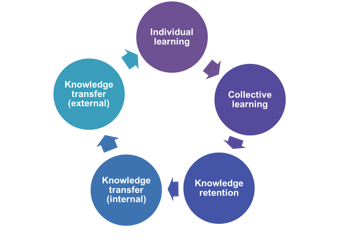
Why does sharing your work matter?
All of the resources collected and shared here seek to support and sustain more effective partnerships in the area of widening participation research, policy and practice.
One of the ways that good partnership working can be realised is through the sharing of ideas, findings and ways of working.
Not only can sharing your work spark creativity and get people thinking about and doing things differently, it can help build an archive of memory which individuals, institutions and the sector can draw on to improve practice.
The democratic nature of Students’ Unions means there is a regular turnover of student officers who lead the organisation. This contributes to the innovative and creative energy that makes working with Students’ Unions unique. It also means that loss of knowledge is a very real risk so work to make connections with full time Union staff who can help support continuity is key.
Mutual learning and sharing your research can be one way of keeping hold of memory and ensuring a continuity of knowledge.
Learning from others’ and sharing your own work, or knowledge exchange, is a vital part of a vibrant research culture.
Rachel Clarke: Knowledge Exchange Advisor
Sharing work is also central to sustaining a whole institution approach to widening participation. Dr Maggie Hutchings and Alex Wardrop have been exploring how widening participation is learnt within different organisations and across the sector. They have been mapping a complex relationship between individual learning and sharing that understanding across organisations and the sector. |
 |
||
How can I share my work better?
You can share your research with different audiences in different ways:
Journals:
The Guardian’s Higher Education Network has a number of Top Tips for writing and publishing in academic journals.
There are a number of different academic journals that accept articles or book reviews in this area, here are just a few:
The Open University’s journal Widening Participation and Lifelong Learning is a key journal in the field and publishes multiple issues each year.
International Studies in Widening Participation is an Australian-based but internationally-focused journal. It seeks articles that are interdisciplinary and extend current research about widening participation in education in the context of wider issues, trends or theories
The Journal of Further and Higher Education publishes pieces that engage with the broad area of post-compulsory education, including management and administration, teacher education and training, curriculum, staff and institutional development and teaching and learning strategies.
Data:
If you are looking to share your data, here’s a best practice guide to help you through the process.
Blogs:
You don’t have to share your research in academic journals to have a wide reach. One way to share work is through writing for, or producing your own, blog.
Universities and colleges often have established blogs in place to share particular areas of work.
Dr Eric Anthony Grollman has written about how blogging forms an integral part of doing academic work for social and academic activism and transformation.
The LSE Impact Blog has a number of fantastic resources for those wanting to maximise the impact of their research through using social media.
The Conversation is an independent source for academic and research news and debate. Their aim is enable better public conversations on complex issues and current affairs.
Social Media:
Connected Researchers outlines key web tools for researchers.
This piece outlines the value of using Tumblr and Facebook to engage students
JISC has produced five reasons why Twitter is valuable for CPD.
Here are some examples of best practice for educators using Twitter.
Online Academic has a guide to using Twitter for academics.


